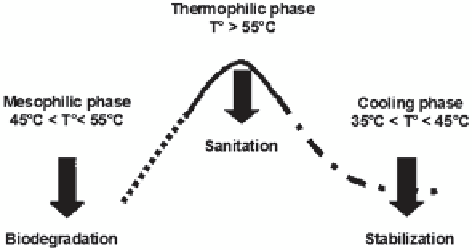Agriculture Reference
In-Depth Information
Fig. 10.1
Major classic
phases of municipal solid
waste composting pro-
cess based on temperature
parameter
Thermopilic Phase: this phase is important in time which could be occurred be-
tween 30 and 100 days of composting process (Hassen et al.
2001
; Ben Ayed et al.
2007
). This phase improve the development of thermophilic microorganisms ac-
cording to the authors. The temperature must be maintained below 65 °C inside the
windrow of wastes by ventilation and watering. Marrug et al. (
1993
) mentioned
that temperature above 60 °C affect the decomposition rate of the waste organic
matter as a result of microbes activities decrease. This phase is known as a phase of
compost sanitation which heat sensitive pathogens like viruses, bacteria, protozoa
or helminthes (Strauch
1991
) could be eliminated.
Cooling or Stabilization Phase: in this phase the temperature began to decrease
after 12th week according to Hassen et al.
2001
and after 111 days according to Ben
Ayed et al. (
2007
). By the end of the process, the average temperature inside the
windrow showed a reduction of values to reach approximately 30 °C. This decrease
was the result of depletion of organic compounds in compost and C/N ratio tend to
stabilize. The end product or compost is available for agricultural use. This practice
is becoming one of the most promising ways for the remediation of degraded soils
(Bouzaiane et al.
2007a
). However, the main requirement for the safe use or appli-
cation of compost to agricultural lands is its degree of stability, which implies stable
organic matter content (Castaldi et al.
2004
,
2008
; Mondini et al.
2004
).
Bouzaiane et al. (
2011
) evaluated that the microbial biomass C and N and DNA
content during the municipal solid waste composting process can be used to un-
derstand the compost stability state. According to the authors biological properties
could be combined to chemical properties, to indicate the compost stability.
10.3.2
MSW Compost Application Improves Agricultural
Soil Properties
Application of MSW compost in agricultural soils can directly improves soil physi-
co-chemical properties such as soil organic matter contents, soil aggregates, buff-
ering capacity (Reeves
1997
) and soil biological properties such as soil microbial
biomass and activity (Pedra et al.
2007
; Roca-Perez et al.
2009
).

